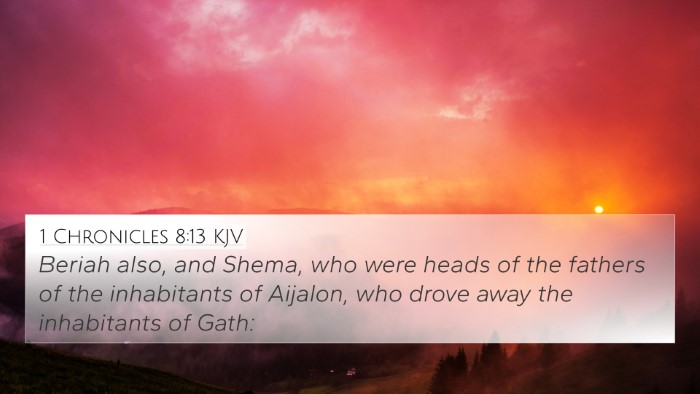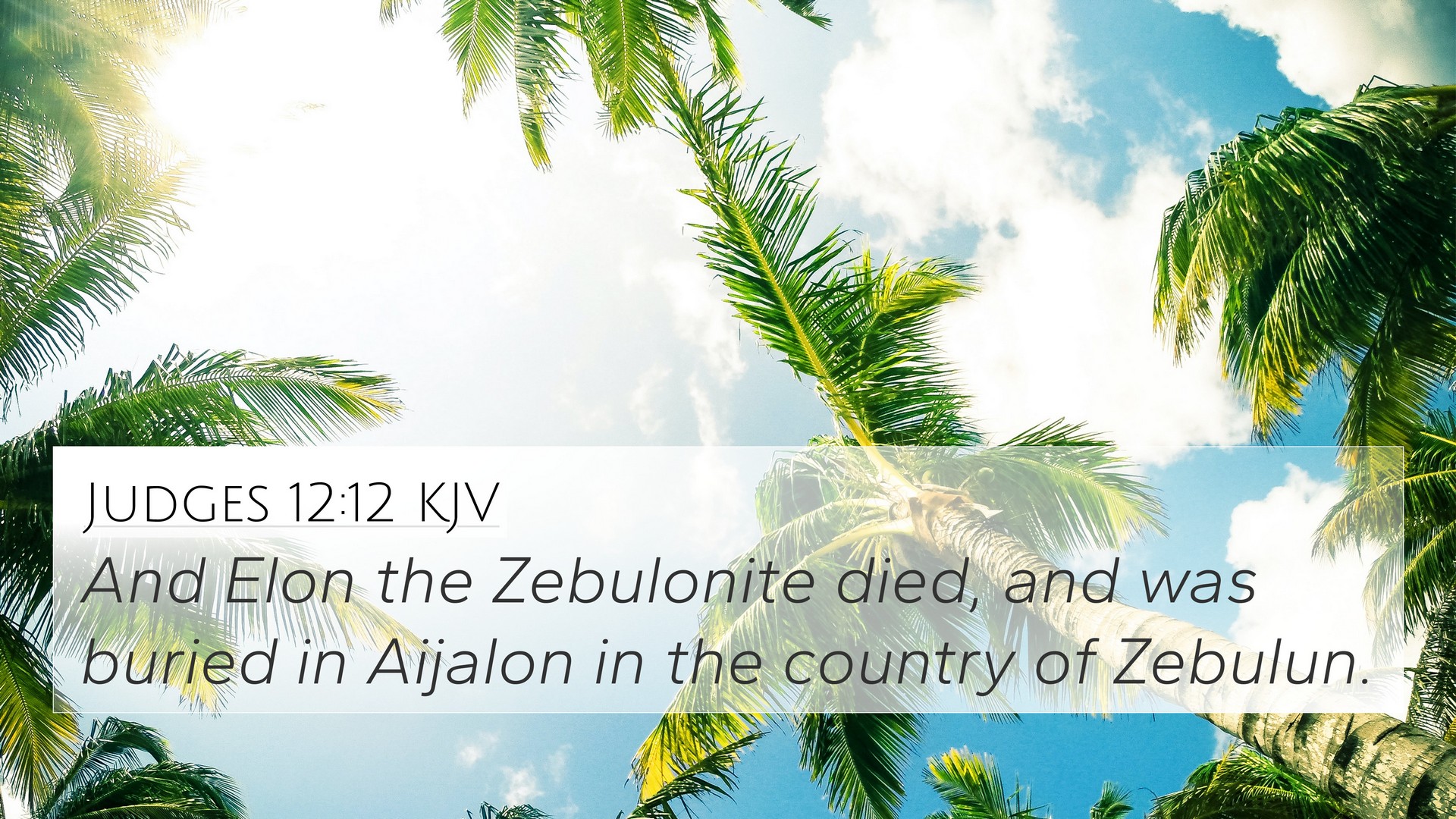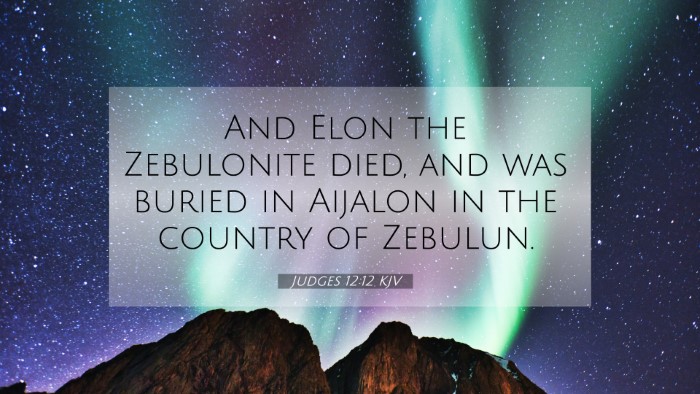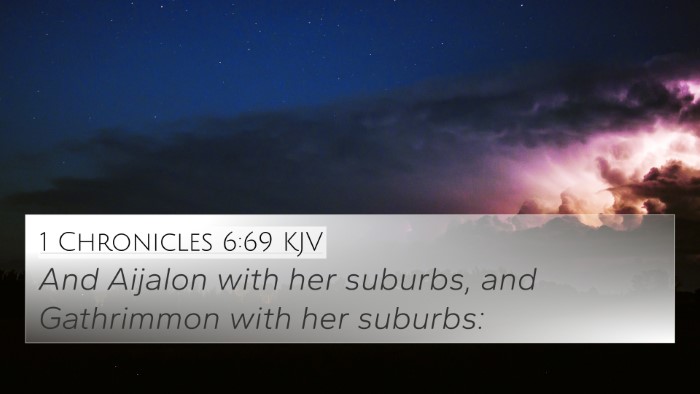Old Testament
Genesis Exodus Leviticus Numbers Deuteronomy Joshua Judges Ruth 1 Samuel 2 Samuel 1 Kings 2 Kings 1 Chronicles 2 Chronicles Ezra Nehemiah Esther Job Psalms Proverbs Ecclesiastes Song of Solomon Isaiah Jeremiah Lamentations Ezekiel Daniel Hosea Joel Amos Obadiah Jonah Micah Nahum Habakkuk Zephaniah Haggai Zechariah MalachiJudges 12:12 Similar Verses
Judges 12:12 Cross References
And Elon the Zebulonite died, and was buried in Aijalon in the country of Zebulun.
Uncover the Rich Themes and Topics of This Bible Verse
Listed below are the Bible themes associated with Judges 12:12. We invite you to explore each theme to gain deeper insights into the Scriptures.
Judges 12:12 Cross Reference Verses
This section features a detailed cross-reference designed to enrich your understanding of the Scriptures. Below, you will find carefully selected verses that echo the themes and teachings related to Judges 12:12 KJV. Click on any image to explore detailed analyses of related Bible verses and uncover deeper theological insights.

1 Chronicles 8:13 (KJV) »
Beriah also, and Shema, who were heads of the fathers of the inhabitants of Aijalon, who drove away the inhabitants of Gath:
Judges 12:12 Verse Analysis and Similar Verses
Bible Verse Meaning and Interpretation: Judges 12:12
Judges 12:12 states: "And Jephthah judged Israel six years. Then died Jephthah the Gileadite, and was buried in one of the cities of Gilead." This verse ends the narrative of Jephthah and provides insight into the period of judges in Israel's history.
Contextual Summary
This verse concludes the account of Jephthah, who was a judge during a tumultuous time for Israel. He is known for his military prowess and his controversial vow, which led to significant personal sacrifice. Understanding the implications of his leadership and the cultural context is important in grasping the significance of his reign and death.
Insights from Commentaries
-
Matthew Henry:
Henry emphasizes the brevity of Jephthah's judgeship and the need for a review of his life. He draws attention to the impact of Jephthah's faith and military success, contrasting it with the despair of Israel's continued struggles. Jephthah's death ends a chapter of turbulent leadership, reminding the reader of the fleeting nature of human authority.
-
Albert Barnes:
Barnes highlights Jephthah's significant role within his time, noting the political and social challenges Israel faced. His commentary reflects on the duality of Jephthah's life: a man of valor yet troubled by his actions. The conclusion of his judgeship invites reflection on the lessons of leadership, sacrifice, and the consequences of rash vows.
-
Adam Clarke:
Clarke notes the geographical importance of Gilead, where Jephthah was buried. He discusses the significance of memorializing judges as a means of preserving Israel’s history. Clarke’s insights encourage consideration of how leadership influenced the nation’s trajectory and highlights the need for righteous governance.
Cross References
Several Bible verses relate closely to Judges 12:12, enhancing our understanding through cross-referencing:
- Judges 11:29-31: This passage describes Jephthah's vow and the events leading to his victory, setting the stage for his judgeship.
- Hebrews 11:32-34: Jephthah is mentioned in the "Hall of Faith," illustrating the complexity of his legacy.
- 1 Samuel 12:11: Samuel references judges in Israel, reflecting on the cycle of leadership similar to that of Jephthah.
- Judges 10:6-7: This section details Israel’s sinfulness and God's anger, explaining the context in which Jephthah arose as judge.
- Judges 12:7: This verse discusses Jephthah's life post-judgeship, delving into the consequences of his actions.
- 1 Chronicles 5:27: A genealogical reference that may point to Jephthah’s lineage and significance within Israel's history.
- Matthew 5:34-37: New Testament teachings on oaths can be examined in light of Jephthah's vow, providing a moral dimension to the story.
Connections Between Judges 12:12 and Biblical Themes
Judges 12:12 illustrates several significant themes in the Bible:
- The Fragility of Leadership: Jephthah's short term as a leader reflects the transient nature of human governance.
- Consequences of Vows: His life serves as a warning regarding the seriousness of promises made to God.
- Divine Sovereignty: Despite Israel's failings, God raised judges to deliver His people, showcasing His involvement in their history.
Thematic Bible Verse Connections
Exploring thematic connections across scripture can deepen our understanding of Judges 12:12:
- Leadership in Crisis: Examining leaders such as Moses (Exodus 3) and Deborah (Judges 4) can provide comparative insights.
- Vows and Sacrifice: The story of Hannah (1 Samuel 1) may also shed light on the spiritual implications of making promises.
- Judgment and Redemption: The cyclical pattern seen in the Book of Judges can be compared to the call for repentance in the New Testament (Revelation 3:19).
Tools for Bible Cross-Referencing
Utilizing a variety of biblical resources can aid in cross-referencing and thematic analysis:
- Bible Concordance: A valuable tool for locating specific verses and their themes.
- Bible Cross-Reference Guide: Provides additional context and connections between passages.
- Cross-Reference Bible Study: Offers methods for studying the interactions between different scriptures.
Conclusion
In conclusion, Judges 12:12 encapsulates important theological reflections on leadership and divine purpose. By studying its context and employing cross-referencing techniques, readers can uncover a richer understanding of scripture and its interconnected messages. Through a comprehensive analysis, the complexities of Jephthah’s legacy provide enduring lessons that resonate throughout Biblical history.




